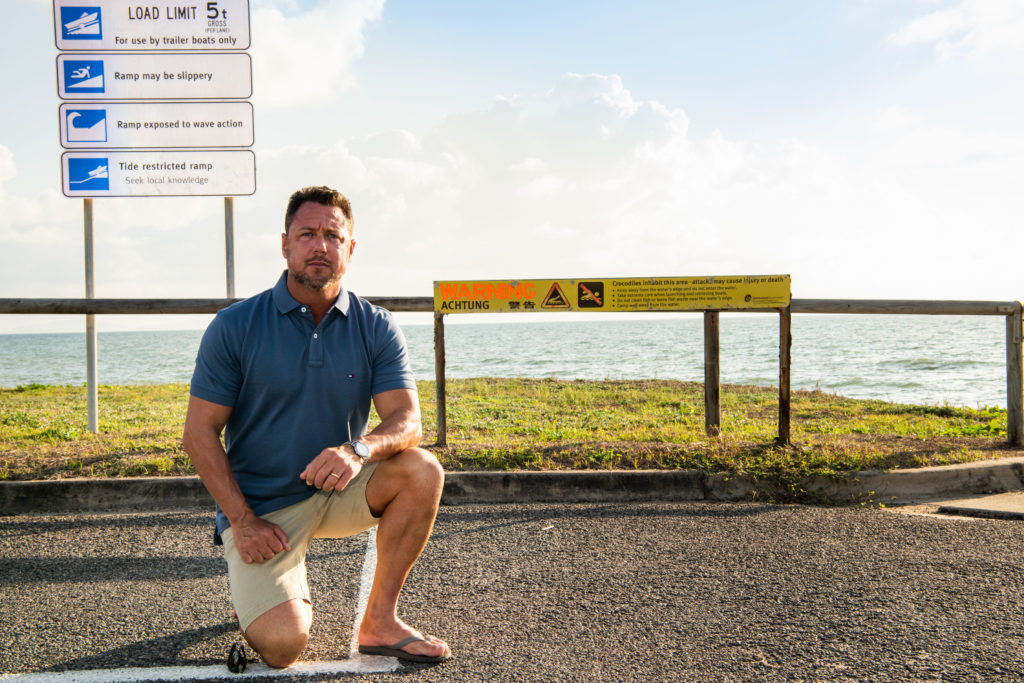State’s apex predator policy a load of croc

Hinchinbrook MP Nick Dametto in front of a croc warning sign in Forrest Beach.
Encounters between humans and deadly estuarine saltwater crocodiles are increasing at astronomical rates in North Queensland, Katter’s Australian Party Leader and Traeger MP Robbie Katter has warned.
Mr Katter, speaking after the tragic crocodile-related death of experienced Cairns sailor Andrew Heard near Hinchinbrook Island at the weekend, said more fatalities were inevitable if the Queensland Government did not act.
The death of Mr Heard follows two non-fatal croc attacks in the North in the past three weeks, including one at Cairns and one at Weipa.
Mr Katter said he was disturbed that once again, focus on this issue had been left to the minor party.
“Both Labor and the LNP are missing in action on this issue, yet again,” he said.
“I expect that they, and their extreme green ‘environmentalist’ friends are likely sneering at us for being uneducated from their ivory towers in parts of the state where the only place you’d see a croc is on the telly.
“For us in North Queensland, crocodiles are a reality and a dangerous reality at that.
“Saltwater crocodiles and human communities do not mix.
“I find it mind-boggling that not wanting your pets, friends and family members eaten by crocs is considered radical these days.”
Mr Katter said since January 1 there have been at least 115 crocodile sightings reported in Queensland, many in built-up areas in the North and Far North like Cairns, Port Douglas and Mission Beach.
Of these sighted crocs, only four were removed and only two were deemed “problem crocs”. These figures do not include the two crocs captured and euthanised as part of the investigation into the death of Mr Heard.
The remaining 109 sightings required no further action, according to the framework of the State’s Crocodile Management Plan, or they remain under investigation.
Government-collected data proves that encounters with crocs in the North and Central Queensland are rising rapidly.
In 2010, there were 175 unconfirmed reports of croc sightings in the state.
By 2015 this had increased to 331 sightings and by 2019, there were 721. Data has not yet been made available for 2020.
Queensland Government representatives have acknowledged there’s been a rapid increase in croc numbers in the North, supporting long-running anecdotal reports from locals who have been encountering the apex predators in places never seen before in their lifetimes.
Mr Katter said the KAP would convene during the first parliamentary sitting of the year next week, to discuss the re-introduction of the party’s Safer Waterway Bill.
This bill, drafted and introduced twice into the parliament by KAP Hill MP Shane Knuth, would create a Crocodile Authority to be based in Cairns.
The Authority would decide on the number of crocs – which posed a safety threat – that should be culled annually (or less often if not necessary), enable Indigenous groups to host crocodile-hunting tours and allow crocodile eggs to be harvested as is done successfully in the Northern Territory.
Mr Knuth said it was a complete cop-out that the State Government was creating an excuse to do nothing by pointing out that North Queensland waterways were a croc habitat and “croc country”.
Yet for decades, locals enjoyed swimming in these waterways without the fear of being taken by a croc.
“The reality is croc numbers have exploded with reported sightings tripling in the last 10 years,” Mr Knuth said.
“So, what this is telling us is that the State Government’s crocodile management plan has been an utter failure.”
KAP Hinchinbrook MP Nick Dametto said it was possible to manage the species much better through commercial harvesting, similar to mud crabs and barramundi.
“Their biomass is in such a state that it would be sustainable to take them from the fishery,” Mr Dametto said.
“They are the apex predator and they’re not in any danger of becoming extinct.
“At the moment the DES officers, based in Brisbane, are making the decisions when it comes to crocodile management in North Queensland.
“They’re not living with the problem, we are, and that’s something locals have a real issue with.”
The KAP will also lobby for the Palaszczuk State Government to fund a study that enables a clear and up-to-date understanding of estuarine crocodile populations and habitats (new and historical) in Queensland.





